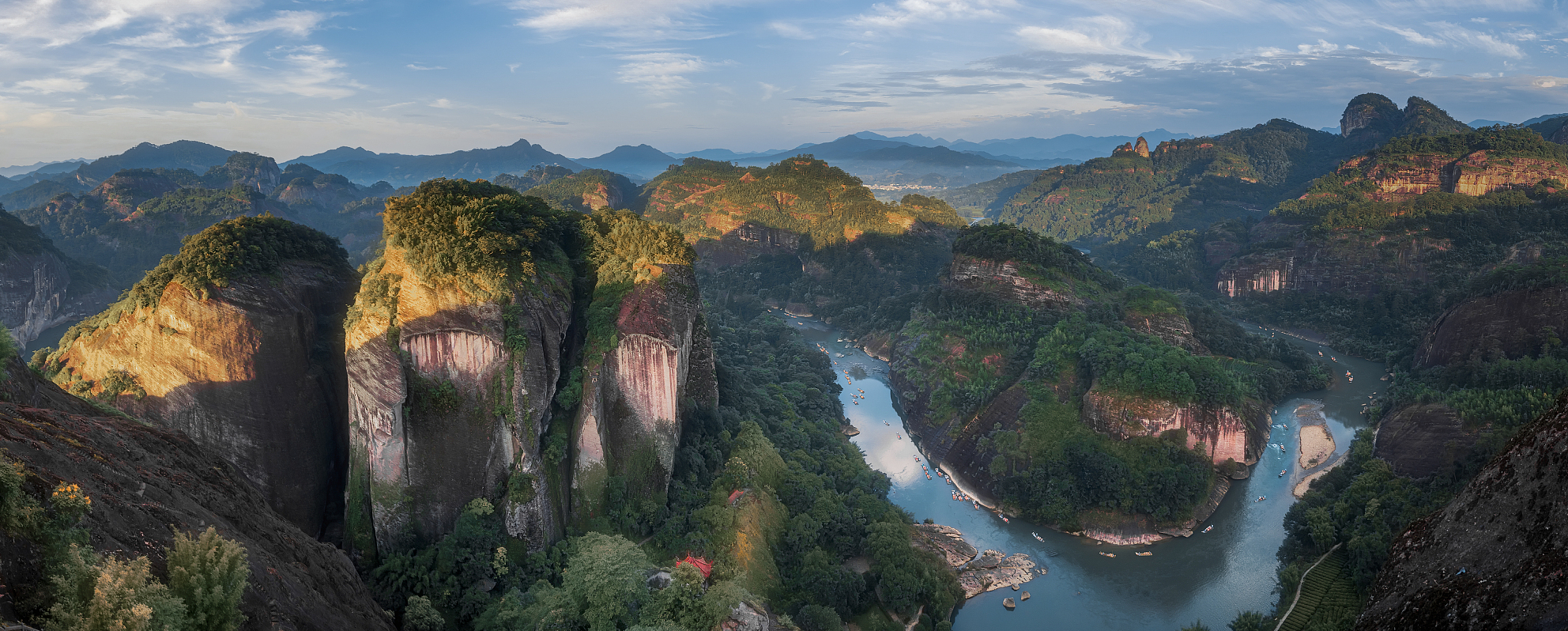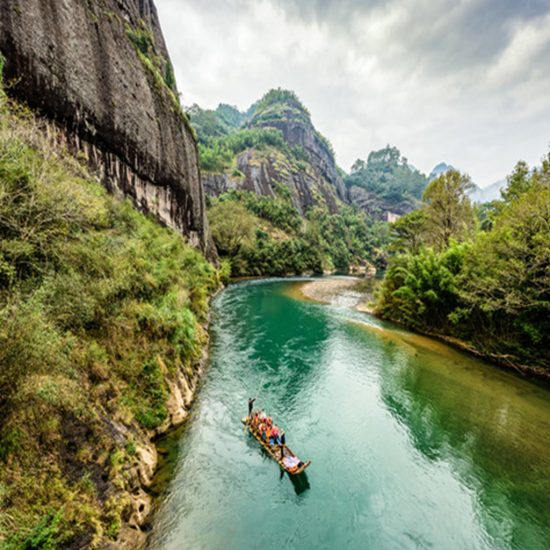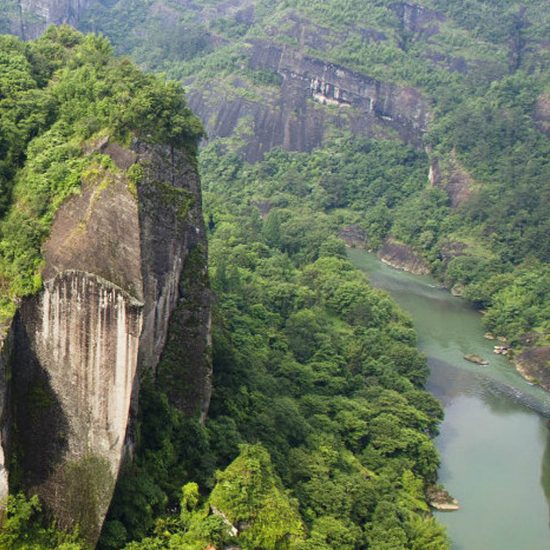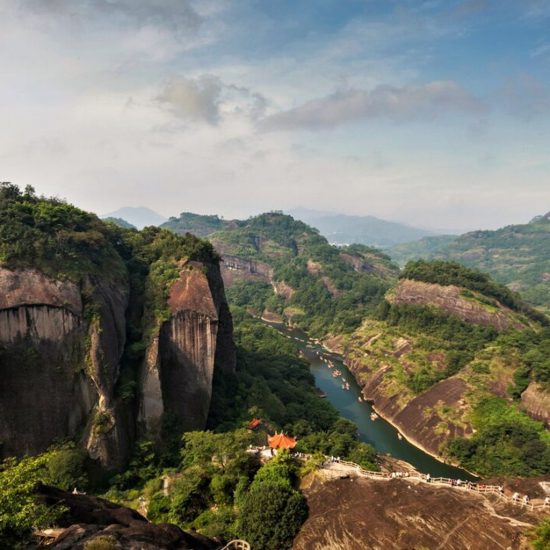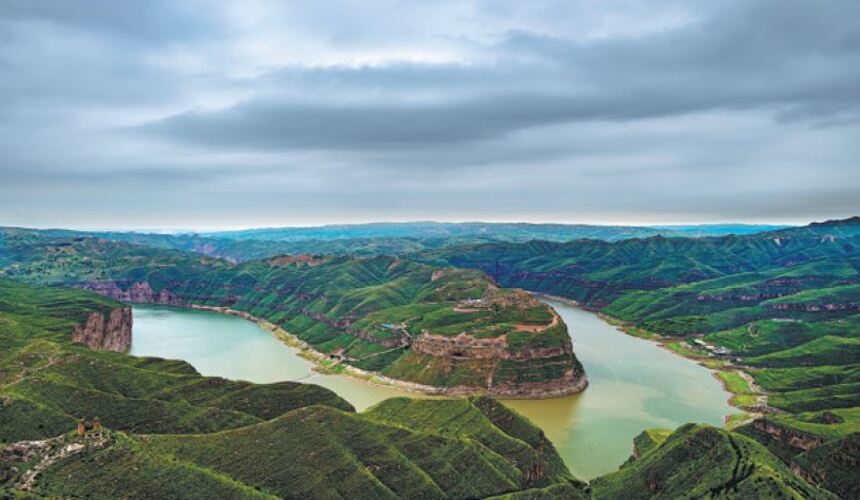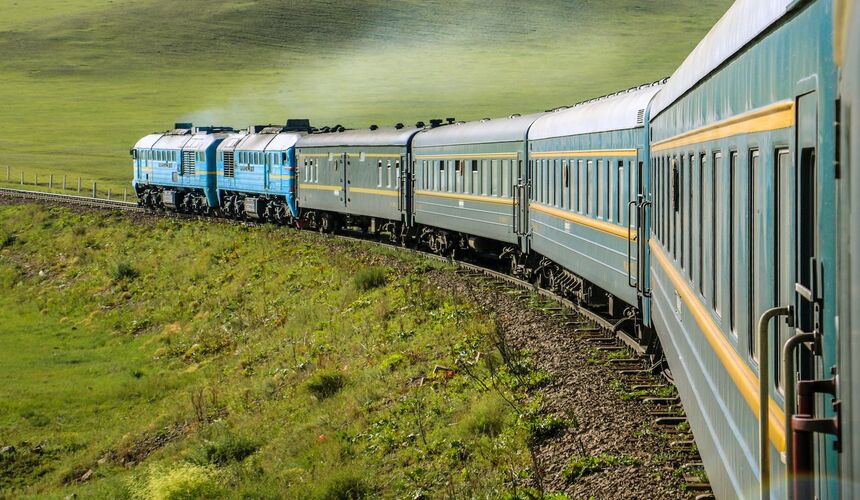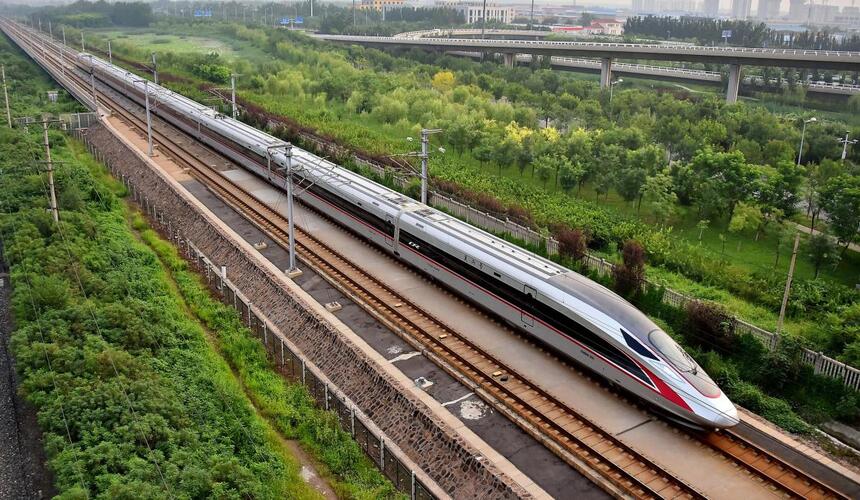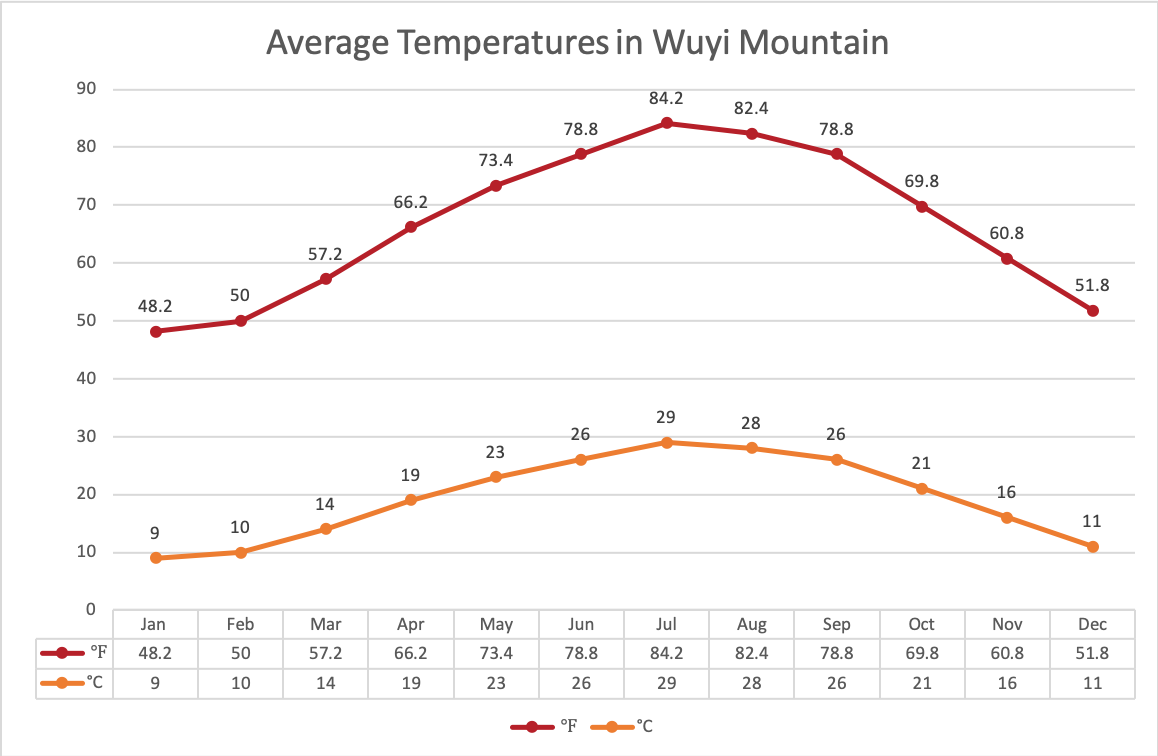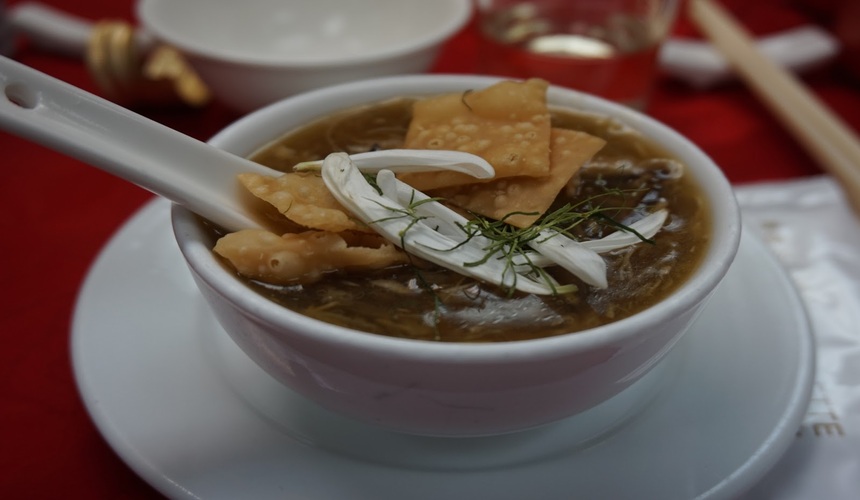Outstanding mountain for biodiversity
Wuyi, located in Zhejiang province, is renowned not only for its lotus seeds but also for its exceptional biodiversity conservation efforts in southeast China. The area serves as a sanctuary for numerous ancient and relict species, many of which are endemic to China. Additionally, Wuyi boasts China’s largest reserves of fluorite, as well as stunning mountainous landscapes and invigorating hot springs. The Nine Bend River’s dramatic gorges, dotted with temples and monasteries – many now in ruins – provided the setting for the development and spread of neo-Confucianism. This philosophy has been influential in East Asian cultures since the 11th century. Popular attractions in the area include Yanfu Temple, Mount Niutou, Qingshui Bay Hot Springs Resort, the ancient village of Yuyuan, and the Dahongyan Rock.
Wuyi Mountain is a year-round destination, with the best times to visit being spring, summer, and autumn. Typhoon days and cold snaps in winter should be avoided. Spring is the traditional peak season for tourism in Wuyi Mountain, as it is the time for tea-making and the fragrance of tea permeates the Big Red Robe Scenic Area. Although the temperature may be high during summer, it is the season when everything grows abundantly, and the scenery in Wuyi Mountain is at its best. If you prefer less crowded places, consider visiting Wuyishan in autumn. With light winds, clear skies, and pleasant sunny weather, taking a bamboo raft ride on Jiuqu Stream can provide a peaceful escape from the hustle and bustle of the city.
Wuyi Mountain is situated in the southwest of Fujian Province and has a humid subtropical monsoon climate. It experiences four distinct seasons and has a mild and humid climate. The annual average temperature is approximately 18℃, with the lowest average monthly temperature being around 8℃ in January and the highest average monthly temperature being around 29℃ in July. The annual average sunshine hours are approximately 1,630. Wuyi Mountain receives the highest rainfall in Fujian province, which is concentrated from March to June every year.
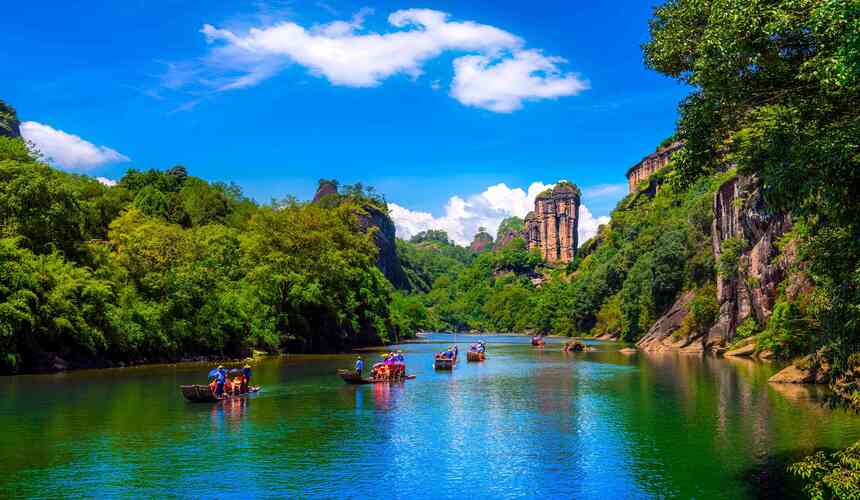
Tianyou Peak
Tianyou Peak is the first scenic spot in Wuyi Mountain and is also the primary destination for most visitors. Standing at an altitude of 410 meters, Tianyou Peak stands out from the cluster of peaks. Surrounded by clouds and mist, Tianyou Peak is encircled by famous peaks and Nine Bend Stream, making it an excellent viewing platform for the Wuyi landscape. On the way up, you can see many ancient trees growing prosperously. Upon reaching the peak, you can feast your eyes on the sea and clouds, which vary unpredictably, creating a fairyland-like atmosphere.
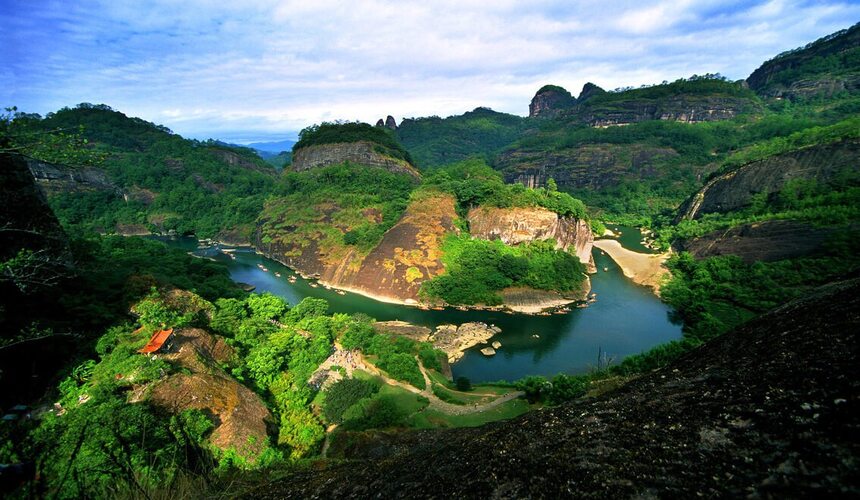
Nine Bend Stream
Nine Bend Stream is the main attraction of Wuyi Mountain. The 62.8 km bamboo raft ride offers stunning views of the mountain and waterscape. Each bend provides a unique blend of leisure, excitement, and thrill. The picturesque landscape and the interest of rafting are the main attractions.
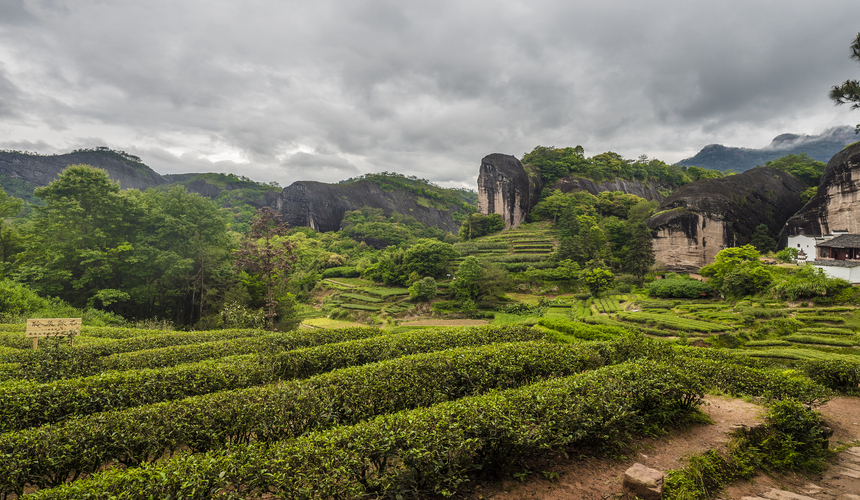
Dahongpao Scenic Area
The Dahongpao Scenic Area is located in the central part of Wuyi Mountain. In this area, you can visit the Yongle Buddhist Temple, the largest temple in this mountain, and the place where the world-renowned Da Hong Pao tea grows. Da Hong Pao is one of the top 10 famous teas in China and is considered a treasure. It was also offered as a tribute to the emperor during the Ming dynasty. There are less than 10 seed trees growing on the cliff, all of which are over 1000 years old.
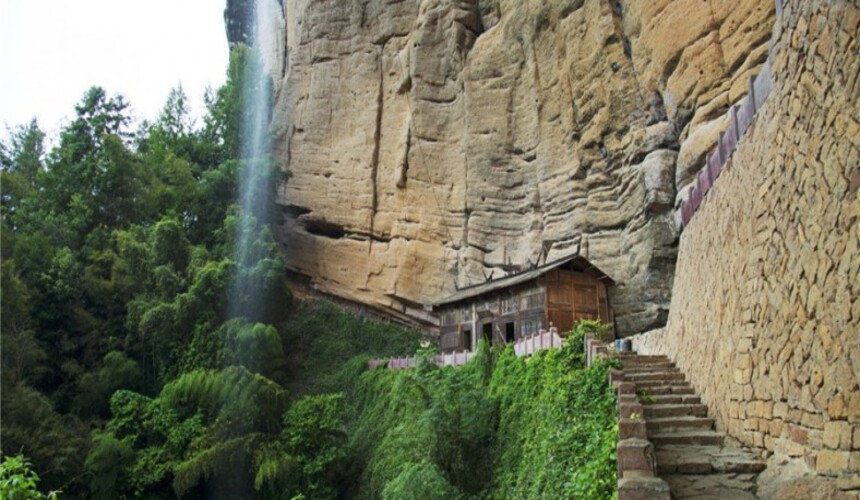
Shuilian water Cave
The Shuilian Water Cave is the widest cave in Wuyi Mountain and can accommodate up to 1000 people. While rafting on the pure stream, you can enjoy the sight of a waterfall cascading down and two cliff springs pouring like flying dragons. Additionally, you can catch a glimpse of the landscape of a bonsai-style tea garden through the bright water curtain that looks like it's made of crystals.
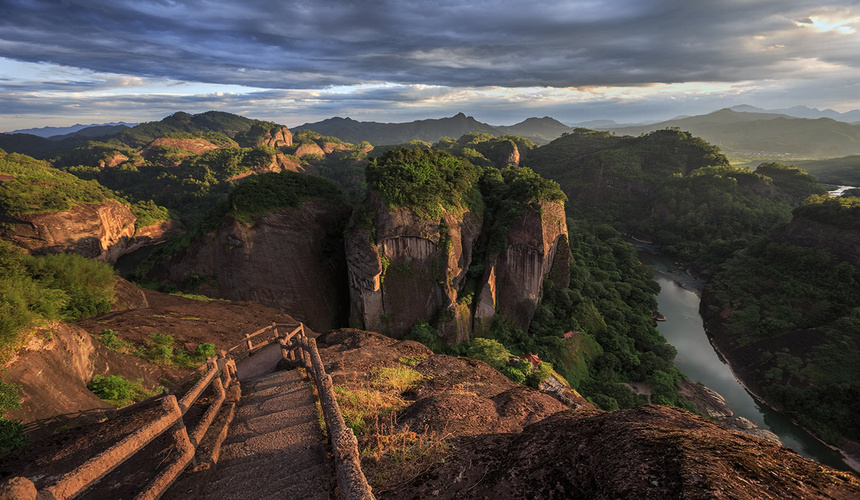
Huxiaoyan Rock
Huxiaoyan Rock is a remarkable location in Wuyi Mountain. The wind passing through the cave on the rock sounds like a roaring tiger, which is truly awe-inspiring. Additionally, from the viewing deck near Dingmin Bridge, located at the end of Huxiao Yan, you can enjoy a magnificent panorama of the lush mountains.
Wuyi Mountain is renowned for its ‘caught on the mountain food’, which includes a variety of animal delicacies such as flying, swimming, slithering, and hopping creatures, as well as fungus and bamboo dishes.The mountain is renowned for its variety of locally produced wines, ranging from chrysanthemum to snake-flavoured types, as well as its famous dishes such as Shilin frogs, various snake dishesoften cooked with fungus or bamboo, and Jiuquzhufa made by the chefs of the Wuyi Hotel.
Must-try: Jiuquzhufa, Grilled Bean, Snake Banquet, Wuyishan Wonton, Nutrient Soup by Pot.
Air
Wuyishan City has only one airport, namely Wuyishan Airport. The airport provides direct flights to several destinations including Xiamen (1 hour), Beijing (about 3 hours), Shenzhen (about 1.5 hours), Chengdu (about 2.5 hours), Guangzhou (about 1.5 hours), Nanjing (about 1.5 hours), and Qingdao (about 2.5 hours). Wuyishan Airport is located approximately 12.5 km northeast of the south gate of Wuyi Mountain.
Train
There are three railway stations near Wuyi Mountain, but the most commonly used are Wuyishan North Railway Station and Nanping Railway Station. Wuyishan North Railway Station is located approximately 28 km northeast of the south gate of Wuyi Mountain. It offers train services to and from major cities such as Beijing, Shanghai, Xiamen, Shenzhen, Fuzhou, Changsha, Guilin, Huangshan, Wuyuan, Nanjing, and Hangzhou. It takes about half an hour by car to reach Wuyi Mountain from Wuyishan North Railway Station.
Nanping Railway Station was previously known as Wuyishan East Railway Station until its name was changed in 2019. It serves as a high-speed railway station with bullet trains travelling to and from major cities such as Beijing, Shanghai, Xian, Fuzhou, Xiamen, and Huangshan. Notably, Nanping Railway Station offers more daily high-speed trains than Wuyishan North Railway Station.The distance by car between this railway station and the south gate of Wuyi Mountain is approximately 27 kilometers, which is almost the same as from Wuyishan North Railway Station. Nanping Railway Station offers direct Fast Bus service to the south gate of Wuyi Mountain.


